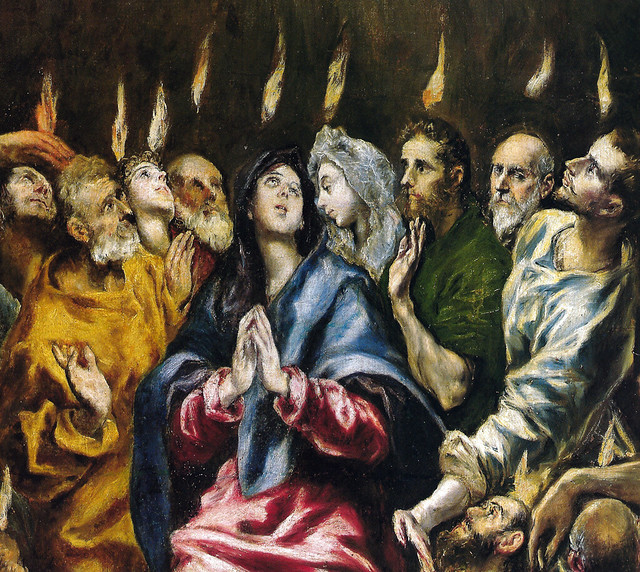
We breathe involuntarily, twenty thousand times a day. It happens without our notice, over and over. In fact, we have to pay attention to stop it. We are just designed to do it. In the beginning of creation, our tradition tells us, God breathed his spirit (literally “breath”) into us and we became alive. We can’t live without the Spirit, even though we don’t know where it comes from or where it goes, even though we don’t notice it.
This is true even in theology where Pneumatology (the study
of the Spirit), where it is undertaken at all, is often prefaced with apologizing remarks that the Holy Spirit is so neglected, compared to her
more cited Trinitarian relations, the Father and the Son. When’s the last time
you prayed to the Spirit anyway? This could be explained by a number of
things--maybe the lack of a more concrete referent (the tangible “Father”
and human being Jesus of Nazareth vs the ephemeral “breath,” “wind,” “spirit”).
Pentecost, one of the Church’s principal feasts is our
modest attempt to rectify our lack of attention. We remember what’s sometimes
called “the Church’s birthday,” the occasion when the Holy Spirit was breathed
onto the disciples, and her fire allowed them to preach the Gospel in all the
tongues of the Earth, rectifying the confusion and alienation of the Tower of
Babel (the story of how human arrogance caused us to be divided).
In my college chapel, we had a practice that gave some
insight into what the Pentecost experience must’ve been like. We got anyone who
knew a second language to that Sunday’s gospel reading at the same time. The
result is an overwhelming jumble of languages. Some people probably assumed
this was some sort of crazy tongues-speaking cult. If you were unchurched and
visiting, you may have assumed like the original overhearers that these people
are drunk. But we understand something mysterious and divine at work, sharing
God’s universal good news, to all the ends of the earth.
The Creed states the Spirit “proceeds from the Father and
the Son.” It is the fruit of the full, eternal outpouring of love between God
the Father and Jesus Christ. This very same Spirit works in the world as the
mysterious agency that Jesus breathes on the Church, so she may accomplish her
mission.
We breathe in the Holy Spirit without noticing (ie
inspiration). It works in us, in others, and in the world. We don’t understand
it, and necessarily so, but we can still be a little more cognizant and
grateful. Through Georg Lucacks I learned about “reification” or “the fallacy
of misplaced concreteness,” or we might even say less poetically “thing-ification.”
We look at a chair and see only a thing. But a chair is in fact a complex
relationship between people, the product of the labor of countless people, who
chopped the wood, shipped the materials, assembled the chair, sold it, etc.
Instead of seeing social relations, we see a thing. That’s reification.
In the same way we “reify” the spiritual life. The doctrine
of the Trinity tells us that God at the very heart is a relationship. Creation itself
is the product of a beautiful divine movement. Yet too often we fail to
recognize this. We take our life for granted. We take for granted our
relationships, our love. We forget that it is a gift of the divine life. It is
an agency always active. St. Paul tells us with his usual blunt truthfulness
that we do not pray as we ought. But the spirit is at work, interceding,
communicating for us and to us something we can’t even fathom, yet is absolutely
essential.
Even the human interactions we share, we never know how the Spirit is acting. We pass the peace at mass and the Spirit is creating a new spiritual reality. We love our neighbors and the Spirit is opening up new possibilities. If you can even for a little while, quiet yourself to hear the small
voice of God, the breath of the Spirit, blowing in the world.